第1章 THE BLUE WALL(1)
I was born under the Blue Ridge, and under that side which is blue in the evening light, in a wild land of game and forest and rushing waters.There, on the borders of a creek that runs into the Yadkin River, in a cabin that was chinked with red mud, I came into the world a subject of King George the Third, in that part of his realm known as the province of North Carolina.
The cabin reeked of corn-pone and bacon, and the odor of pelts.It had two shakedowns, on one of which I slept under a bearskin.A rough stone chimney was reared outside, and the fireplace was as long as my father was tall.
There was a crane in it, and a bake kettle; and over it great buckhorns held my father's rifle when it was not in use.On other horns hung jerked bear's meat and venison hams, and gourds for drinking cups, and bags of seed, and my father's best hunting shirt; also, in a neglected corner, several articles of woman's attire from pegs.These once belonged to my mother.Among them was a gown of silk, of a fine, faded pattern, over which Iwas wont to speculate.The women at the Cross-Roads, twelve miles away, were dressed in coarse butternut wool and huge sunbonnets.But when I questioned my father on these matters he would give me no answers.
My father was--how shall I say what he was? To this day I can only surmise many things of him.He was a Scotchman born, and I know now that he had a slight Scotch accent.At the time of which I write, my early childhood, he was a frontiersman and hunter.I can see him now, with his hunting shirt and leggings and moccasins;his powder horn, engraved with wondrous scenes;his bullet pouch and tomahawk and hunting knife.He was a tall, lean man with a strange, sad face.And he talked little save when he drank too many ``horns,'' as they were called in that country.These lapses of my father's were a perpetual source of wonder to me,--and, I must say, of delight.They occurred only when a passing traveller who hit his fancy chanced that way, or, what was almost as rare, a neighbor.Many a winter night I have lain awake under the skins, listening to a flow of language that held me spellbound, though I understood scarce a word of it.
``Virtuous and vicious every man must be, Few in the extreme, but all in a degree.''
The chance neighbor or traveller was no less struck with wonder.And many the time have I heard the query, at the Cross-Roads and elsewhere, ``Whar Alec Trimble got his larnin'?''
The truth is, my father was an object of suspicion to the frontiersmen.Even as a child I knew this, and resented it.He had brought me up in solitude, and I was old for my age, learned in some things far beyond my years, and ignorant of others I should have known.Iloved the man passionately.In the long winter evenings, when the howl of wolves and ``painters'' rose as the wind lulled, he taught me to read from the Bible and the ``Pilgrim's Progress.'' I can see his long, slim fingers on the page.They seemed but ill fitted for the life he led.
The love of rhythmic language was somehow born into me, and many's the time I have held watch in the cabin day and night while my father was away on his hunts, spelling out the verses that have since become part of my life.
As I grew older I went with him into the mountains, often on his back; and spent the nights in open camp with my little moccasins drying at the blaze.So I learned to skin a bear, and fleece off the fat for oil with my hunting knife; and cure a deerskin and follow a trail.At seven I even shot the long rifle, with a rest.I learned to endure cold and hunger and fatigue and to walk in silence over the mountains, my father never saying a word for days at a spell.And often, when he opened his mouth, it would be to recite a verse of Pope's in a way that moved me strangely.For a poem is not a poem unless it be well spoken.
In the hot days of summer, over against the dark forest the bright green of our little patch of Indian corn rippled in the wind.And towards night I would often sit watching the deep blue of the mountain wall and dream of the mysteries of the land that lay beyond.
And by chance, one evening as I sat thus, my father reading in the twilight, a man stood before us.So silently had he come up the path leading from the brook that we had not heard him.Presently my father looked up from his book, but did not rise.As for me, I had been staring for some time in astonishment, for he was a better-looking man than I had ever seen.He wore a deerskin hunting shirt dyed black, but, in place of a coonskin cap with the tail hanging down, a hat.His long rifle rested on the ground, and he held a roan horse by the bridle.
``Howdy, neighbor?'' said he.
I recall a fear that my father would not fancy him.In such cases he would give a stranger food, and leave him to himself.My father's whims were past understanding.
But he got up.
``Good evening,'' said he.
The visitor looked a little surprised, as I had seen many do, at my father's accent.
``Neighbor,'' said he, ``kin you keep me over night?''
``Come in,'' said my father.